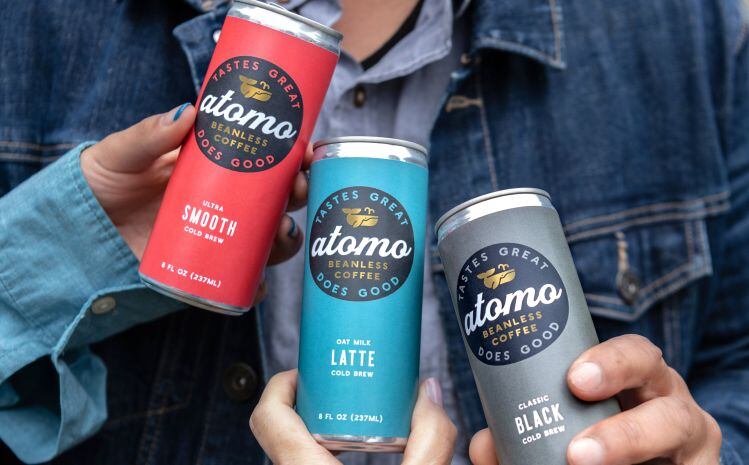“For us, espresso is the top of the mountain. It is the peak. It is the most decadent and experiential way of drinking coffee. It has the crema that comes out. It's such a ritual, and it's such a prized-delivery method for coffee. It is like the highest priced and most coveted ... experience for coffee. And so, for us to be able to replicate that in a real meaningful way that had great tasting notes for us was a major breakthrough this last year.”
Pivoting away from RTD to focus on hot coffee
Started in 2019, Atomo is a “molecular coffee” brand that extracts coffee compounds from upcycled ingredients like date bits to create its beverage. Previously, the brand launched a RTD coffee beverage, but in 2023 discontinued the product to focus entirely on its ground product, Kleitsch said.
“We've been working on hot coffee for four years, and we were not satisfied. And so, when we started 2023, we doubled down on our commitment. We said this is the year we will finally unlock hot coffee and get a great taste of hot coffee, and it actually happened around June when we finally pulled the first shot of espresso that we felt really great about, and as many things, it was a bit of a happy accident.”
Atomo dismantled its RTD manufacturing facility to use components to support the development of its espresso grounds, Kleitsch explained. However, the reconfigured manufacturing facility could only make a small amount of coffee — one pound per day — so the company set out to build an entirely new facility, he added.
“We realize that we had to build a factory to make espresso, and our process is unique enough where we couldn't simply go to a coffee-roasting facility or a beer-brewing facility or a cracker-making facility. We actually had to bring together many different disciplines into one facility to make our grounds. So, our first kind of big bet in 2023 was that we had to invest significantly into building our own factory to produce our espresso grounds.
The new 37,000-square-foot roastery in Seattle, opening by the end of March, will allow the company to “produce up to four-million pounds a year,” which would be a fraction of the “2.5 billion cups of coffee consumed every day,” Kleitsch said. Once this facility is operational, Kleitsch plans to “build another factory, which would be 10 times the size of this factory.”
With this new production capacity, Atomo can grow beyond the one coffeeshop that it currently offers its ground espresso (Gumption Coffee in New York) to shops around the nation. The company went the foodservice route first for several reasons, including that consumers can’t brew the product at home yet, he added.
“We think our product is really a love letter to coffee. We want coffee to be around forever, and we would just like it to be as sustainable as possible. And so, by partnering with coffee shops we're actually giving them the ability to share a new experience with their customers and provide choice where previously customers didn't have choice... So, this is really a way for us to give the coffee shops choice for their consumers to help them differentiate.”
Doubling down or ‘last as long as possible’ amid the capital crunch?
The decision to invest nearly $12.5m in facilities didn't come without its risks, Kleitsch acknowledged. Atomo raised over $53m in the past, with $40m coming from a round in 2022, but that was when the "capital markets cooled off," he added. So, Atomo had to chose to ride out the capital or invest the money to grow its business.
“As we were confronted with the realization that the entire capital market was changing drastically, we had to determine if we were going to try to conserve our capital and last as long as possible, or whether we were going to double down and invest even more in our manufacturing and growing and scaling our business. And what drove our decision-making was our core belief that the planet needs help and that we all need to change the way that we interact with our planet. It can no longer be an extractive relationship that we have.”




